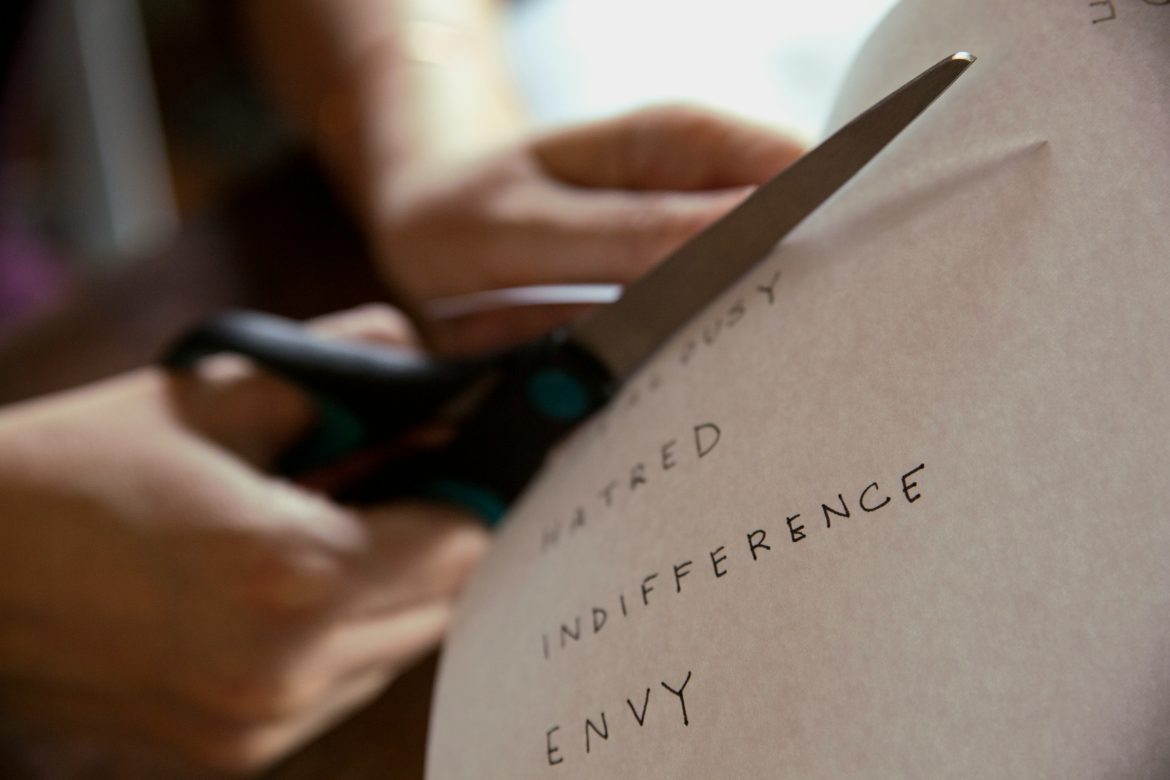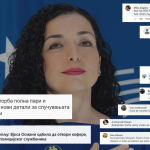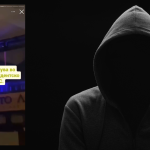Photo by Megan Watson on Unsplash
Throughout the month of June, the RDN monitoring team, including the input of Innovative Media team from the project Reporting Diversity Network – The New Agenda has detected a range of hateful narratives and discourse. This month, we have seen hatred based on gender, sexual orientation, ethnicity as well as an incident of image based sexual abuse and genocide denial.
Image based sexual abuse in Serbia
In Serbia, the feminist organisation OsnaŽene (Empowered women) from Subotica published an article that investigated various Telegram groups in which photos of girls and women are shared without their consent.
Staša Ivković from the organisation infiltrated the Telegram groups, where explicit images of women and girls are shared without their consent, and found requests for pictures of minors, mothers, sisters, and aunts of group members. In those groups, she says, more than 10,000 messages are sent daily, and one of the largest groups has almost 70,000 members.
In response, the media outlet Kurir produced several stories on this topic including a front page dedicated to the article by Osnažene and a short interview with the organisation. Nevertheless, Kurir also launched another article highlighting Telegram groups with thousands of members where nonconsensual photos of women and girls are shared. This article, which also featured on the front page, was titled “Sad: Girls on Telegram offer their erotic photographs for 35e a month”. The front page featured a picture of a woman in her underwear.
In this story, Kurir blamed women for this online phenomenon, citing “experts” who support damaging patriarchal narratives unsubstantiated by facts. One of these so-called ‘experts’ was psychologist Marija Milenković, who was quoted saying that “this is an evil age for men. It is very difficult to play roles that are completely deranged. Men no longer know what to do or how to behave. They don’t know if they should buy a woman or try to work hard for her and get her in some other way. There is less and less sacrifice and sincere emotions, and they cannot develop if the girl has a price”. Such stereotypical depictions of a patriarchal society, coming from an alleged expert only further justifies cases of gender-based violence and image based sexual abuse. The sharing of nonconsensual photographs – be it naked or not – is both illegal and highly immoral. By no means should such actions be justified by any individual and any means to do so would be extremely harmful. Kurir, a media outlet with a large readership and platform should, furthermore, be using its influence to call out, name and shame such acts and provide further education to the public on the harms of such incidents rather than upholding and justifying this case and the nature of patriarchal societies.
Sexism in Albania
In Albania, on June 12, Bujar Kapexhiu, a famous Albanian comedian, caricaturist, director, actor and lecturer, was invited to the radio program “Ndryshe”. During the live stream, he made the following statement: “Humour is a privilege of the wise; women do not have the capacity to create it. I doubt that women write screenplays.” The hosts responded to his statement with a variety of reactions. One of the journalists shook hands with the comedian whilst the other laughed but also shared the following opinion – “we need to be cautious because women’s organisations might react to Kapexhiu’s statement, saying “he is discriminating against us”. One of the three radio hosts said that “it’s a joke” but it was clear from the laughter that that statement was not a clear remark to condemn the misogyny. Overall, among these reactions, not a single host took the opportunity to condemn the controversial statement.
Furthermore, after the program, media outlets in Albania widely circulated the story, featuring the controversial statement as the headline. However, despite using sensationalist headlines for clickbait and views, the reports did however, also include references to women who have been part of the Albanian comedy scene and theater. Additionally, some media outlets, for example Tema and Revista Class also labelled the statements as sexist. ZERI (a media outlet) contacted Kapexhiu again to see if he would like to retract his comments, but he responded, “I am sure women can’t write screenplays”. Consequently, ZERI reported the incident to the AMA (Audiovisual Media Authority) and is currently awaiting their response.
Nevertheless, radio shows should not provide the space for the spread of sexist remarks and should immediately address sexism at the time and place of expression. Radio show hosts have a responsibility to avoid discrimination on any ground, and thus to condemn sexism and misogyny from their guests because failing to do so perpetuates harmful stereotypes and undermines the values of respect and equality. By taking a stand against such behaviour, hosts can foster a more inclusive and respectful dialogue, setting a positive example for their audience.
Ethnic hatred and inflammatory speech by politicians in Montenegro
The month of June marked various incidents of hate speech and inflammatory rhetoric along ethnic lines spread by politicians in Montenegro.
At the unveiling of the monument to Predrag Leovac who was a Serbian army member who fought against the Kosovo army during the 1990s war, Dario Vraneš, the mayor of Pljevlja municipality, delivered a speech. In his address, Vraneš made several inflammatory remarks targeting political opponents of Serbs in contemporary Montenegro, as well as past adversaries, such as the Albanians from Kosovo. Although he did not explicitly name these groups, he referred to them as “enemies,” “crows,” and “unmentionables”. He suggested that friendships with other nationalities are impossible and indirectly issued threats by stating that Leovac would serve as a role model for future generations of “Serb knights”.
Alongside this, Marko Kovacevic, the mayor of Niksic, stated during the commemoration of the 166th anniversary of the Battle of Grahovac on June 13th that “if someone doesn’t want us to be brothers, if someone wants to look more like Turks, then in the future we will treat them like we treat Turks”. During the Battle of Grahovac, in 1858, at the time of the Herzegovinian uprising, the Turkish army was defeated by the Montenegrin army. Kovačević called that army “Christian warriors of the Serbian army of Montenegrins and Herzegovians”. Kovačević is an official of the pro-Russian party New Serbian Democracy. Since he became mayor of Niksic, he has made numerous public statements on an ethnic basis that incite hatred and violence.
Furthermore, pro-Serbian politician from Montenegro, Vladislav Dajkovic, indicated in an unfair way that the Deputy Prime Minister and Minister of Economic Development, Nik Djeljosaj, who is ethnic Albanian, sang “Kill the Serb” during the UEFA game between Croats and Albanians. Several online media such as Analitika, IN4S, CDM republished his statement, without any critical outlook, with the headlines indicating that Djeljosaj truly might have sung “Kill the Serb” although there is no proof of this having taken place. Djeljosaj was simply present during the game and supported the country of his ethnic origin.
Montenegro, like many Balkan countries, is distinguished by its rich multi-ethnic composition. Spreading hate along ethnic lines by politicians undermines social cohesion and contributes to polarisation in Montenegrin society.
Homophobia and anti-LGBTIQ+ narratives in North Macedonia and Kosovo
The month of June marked Pride month globally, with Pride marches being held across many European cities including Skopje and Pristina. Despite Pride marking the celebration of the LGBTIQ+ community’s identity and rights, promoting visibility, acceptance, and equality, some media outlets and members of the public seized this opportunity to spread anti-LGBTIQ+ narratives and propagate hate.
In North Macedonia, Portal Vesti.mk posted an article about how governmental organisations in the country have started to count the citizens and, according to their calculations, there are about 200,000 homosexuals in North Macedonia.
As a result of this article and figure, a stream of hateful comments appeared. The climate in North Macedonia against LGBTIQ+ people is generally not welcoming; therefore, such comments did not come as a surprise. Nevertheless, they are unacceptable. There were even some comments claiming that the NGO that had done the research was probably financed by the Bulgarians and that such calculations are not to be taken seriously. Such comments show how intertwined the narratives of divisions are, targeting ‘the others’. Not only is this case an example of the evident anti-LGBTIQ+ rhetoric persistent within the country but also the level of ethnic hatred. Media portals should monitor and moderate their comment sections to ensure that hate does not thrive and grow on their platforms.
In Kosovo, online “Gazeta Insajderi” published a video recording, that is, a survey with two elderly people. The journalist asked them if they supported the Pride Parade (during Pride Week), whether politicians should support this community, and other questions.
When the journalist added that it was important for Kosovo to join the Council of Europe, one of the respondents said that this is why Kosovo should not be a member of the Council of Europe and that “we are of one religion, and they are of another religion. But regardless of religion, no religion should allow that,” said one of the citizens. Another citizen expressed opposition to the LGBTIQ+ community but supported the adoption of the Civil Code, excluding the provisions related to the LGBTIQ+ community.
Subsequently, the same media outlet “Gazeta Insajderi” published relevant information for the public regarding the beginning of the Pride Parade, an event scheduled during Pride Week. The slogan of this year’s Pride Parade was” “Kemi qen dhe do t’jemi” (We were, and we will be). Over 900 people commented on this information on Facebook, spreading hateful, homophobic messages and narratives towards the LGBTIQ+ community.
Every year when Pride Week is held, the media follow and report from the prepared activities, especially the Pride Parade, in which members of the LGBTIQ+ community and their supporters participate. Pride week is an opportunity for the media to talk about the problems faced by the LGBTIQ+ community and facilitate public dialogue. Nevertheless, hate and discrimination from the public often persists.
The media plays a crucial role in transmitting information and educating their audience, while also bearing the responsibility to prevent the spread of hate, including homophobia. Monitoring their comment sections allows them to promptly address instances of hate speech and ensure a constructive and respectful online environment.
Genocide denial in Bosnia and Herzegovina
Genocide denial has been long persistent within the Balkan region including in Bosnia and Herzegovina. This has since been heightened by the recent UN Resolution to mark July 11th as the International Day of Reflection and Commemoration of the 1995 Genocide in Srebrenica. These narratives strengthened during the month of May, when the UN General Assembly adopted the resolution, however they remained in public discourse throughout this month as well.
In June, Portal Nezavisne novine (Independent newspapers) reported that graffiti with the inscription “people who committed genocide” appeared on the Embassy of the Republic of Serbia. Despite the headline clearly stating that the graffiti was written on the embassy itself, they also reported the statement of the spokeswoman for the Ministry of Internal Affairs of the Sarajevo Canton, Mersiha Novalić, who said that the building on which the graffiti was written on was located ten metres away from the Embassy of the Republic of Serbia. Novalić also stated that the act constituted a violation of the equality of humankind and citizens.
Before and after the adoption of the Resolution on the genocide in Srebrenica, the media in Bosnia and Herzegovina reported statements by politicians from the Republika Srpska entity stating that with the adoption of the resolution Serbs will be called a “genocidal nation”. The General Assembly of the United Nations adopted the Resolution on Srebrenica on May 23, and among the countries that voted against it was Serbia.
In the same article, it was also mentioned that graffiti appeared on the same day on the fences of the embassies of Hungary and Slovakia in Sarajevo. Nezavisne reported that vandals had written ‘the alleged number of victims in Srebrenica’ on the fences. The media noted that Hungary voted against the Resolution at the UN General Assembly, while Slovakia abstained.
By noting that the vandals had written the ‘alleged’ number of victims of the genocide in Srebrenica, Nezavisne novine indeed relativized the number of victims of the genocide in Srebrenica. The International Court in The Hague found that Bosnian Serb forces executed between seven and eight thousand captured Bosnian men and boys in Srebrenica in July 1995. According to the amendments to the Criminal Code of Bosnia and Herzegovina imposed by the High Representative Valentin Inzko in 2021, it is banned in Bosnia and Herzegovina to justify or minimise the crimes of genocide, war crimes, and crimes against humanity in a way that could incite violence or hatred directed against a certain group of people. The media outlet’s dismissal of the documented number of people killed in Srebrenica as merely ‘alleged’ is an act of denial that perpetuates injustice against the victims and their families.





